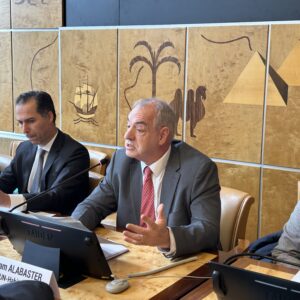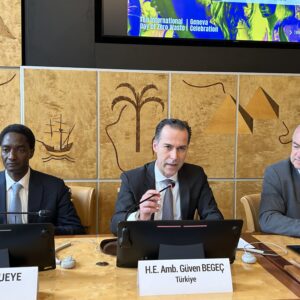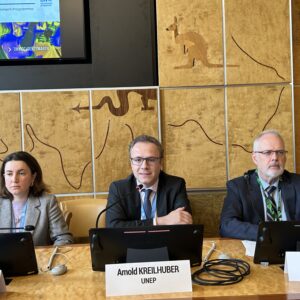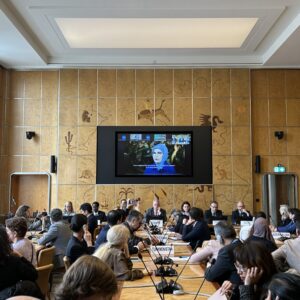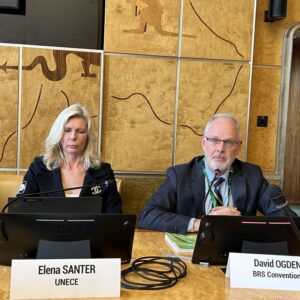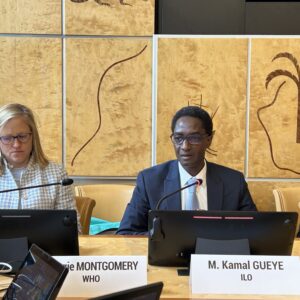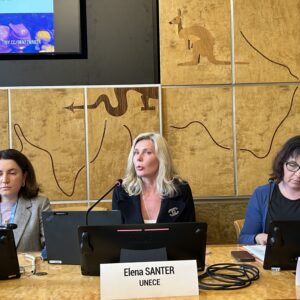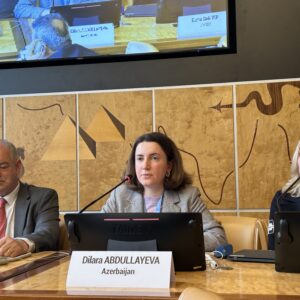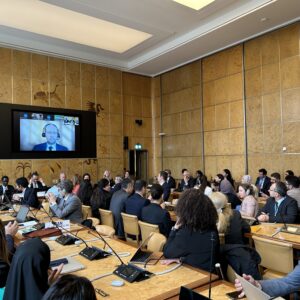Événement Conférence
International Day of Zero Waste 2024 | Geneva Celebration
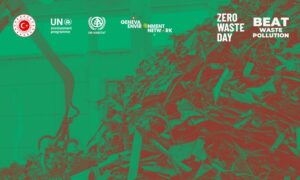
27 Mar 2024
14:00–15:30
Lieu: Palais des Nations, Room VIII & Online
Organisation: Turquie, Geneva Environment Network
International Day of Zero Waste was celebrated for the first time on 30 March 2023, and observed by millions worldwide. For the second edition, all stakeholders are invited to raise awareness of national, subnational, regional, and local zero-waste initiatives and their contribution to achieving sustainable development. International Geneva plays a crucial role in advancing this agenda forward.
About this Event
Waste pollution threatens human health, costs the global economy hundreds of billions of dollars a year, and aggravates the triple planetary crisis of climate change, nature and biodiversity loss, and pollution. Boosting waste management at all levels remains an urgent priority. To solve the waste pollution crisis, humanity must fully embrace a zero-waste approach. This entails responsible production and consumption patterns through promoting a lifecycle approach.
Jointly published by the United Nations Environment Programme (UNEP) and the International Solid Waste Association (ISWA), the Global Waste Management Outlook 2024 report provides an update on global waste generation and the cost of waste and its management. Municipal solid waste generation is predicted to grow from 2.3 billion tonnes in 2023 to 3.8 billion tonnes by 2050. Only 62 percent of this waste is managed in controlled facilities. Some 2.7 billion people lack access to solid waste collection.
In 2020, the global direct cost of waste management was estimated to be at USD 252 billion. When factoring in the hidden costs of pollution, poor health and climate change from poor waste disposal practices, the cost rises to USD 361 billion. Without urgent action on waste management, by 2050 this global annual cost could almost double to a staggering USD 640.3 billion. However, the report’s modelling shows that getting waste under control by taking waste prevention and management measures could limit net annual costs by 2050 to USD 270.2 billion.
On the occasion of the second observation of the International Day of Zero Waste, this event aligns with the objectives of raising awareness of national, subnational, regional and local zero-waste initiatives and their contributions to advance the beat waste pollution agenda. It highlighted the role of Geneva as a major global hub for the governance of hazardous substances and home to several international organizations and multilateral environmental agreements aiming at reaching the zero-waste goal, and celebrated the steps taken by actors in international Geneva and beyond to move forward the zero-waste agenda.

About the International Day of Zero Waste
On 14 December 2022, the United Nations General Assembly adopted a resolution at its seventy-seventh session to proclaim 30 March as International Day of Zero Waste, to be observed annually. Türkiye, with 105 other countries, put forward the resolution. It follows other resolutions focused on waste, including “End plastic pollution: towards an internationally legally binding instrument”, adopted at the United Nations Environment Assembly on 2 March 2022.
The United Nations Environment Programme and the United Nations Human Settlements Programme (UN-Habitat) jointly facilitate the observance of International Day of Zero Waste. Member States and stakeholders are invited to engage in activities aimed at raising awareness of national, subnational, regional and local zero-waste initiatives and their contribution to achieving sustainable development.
Promoting zero-waste initiatives through this international day can help advance all the goals and targets in the 2030 Agenda for Sustainable Development, including Sustainable Development Goal 11 and Sustainable Development Goal 12. These goals address all forms of waste, including food loss and waste, natural resource extraction and electronic waste.
Speakers

H.E. Emine ERDOĞAN
First Lady of the Republic of Türkiye | Chairperson of the Advisory Board of Eminent Persons on Zero Waste (video message)

H.E. Amb. Güven BEGEÇ
Permanent Representative of Türkiye to the United Nations Office at Geneva and other international organizations in Switzerland

Dilara ABDULLAYEVA
Counsellor, Permanent Mission of the Republic of Azerbaijan to the United Nations Office and other international organizations in Geneva | UN Climate Change COP29 Host

Arnold KREILHUBER
Director for Europe, UN Environment Programme

Carlos SILVA FILHO
President, International Solid Waste Association (ISWA) | Member, UN Secretary General's Advisory Board on Zero Waste

Marcos ORELLANA
UN Special Rapporteur on toxics and human rights
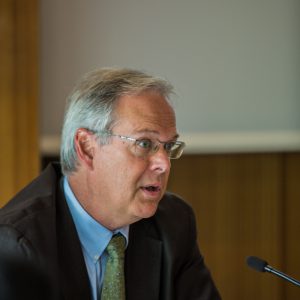
David OGDEN
Deputy Executive Secretary, Basel, Rotterdam, and Stockholm Conventions

Moustapha Kamal GUEYE
Director, Priority Action Programme on Just Transitions, International Labour Organization

Maggie MONTGOMERY
Settings Lead, Water, Sanitation, Hygiene and Health Unit, World Health Organization

Elena SANTER
Environmental Affairs Officer, Environmental Performance Review Programme, UN Economic Commission for Europe

Kamelia KEMILEVA
Co-Director, Global Cities Hub

Uğur İbrahim ALTAY
President of UCLG and mayor of Konya metropolitan municipality (video message)

Graham ALABASTER
Chief, Geneva Office at UN-Habitat | Moderator
Summary
Graham ALABASTER | Chief, Geneva Office at UN-Habitat | Moderator
- Geneva is a major Global Hub for the governance of hazardous substances. It is home to several international organizations and the home of multilateral environmental agreements that are aimed at controlling and beating pollution.
- This work is part and parcel of the Sustainable Development Goals (SDGs) because solid waste management and zero waste is a key part of many of the SDGs.
- Waste poses many threats to human health through air pollution, diseases and the environment, and it also costs the global economy hundreds of billions of dollars a year.
- We must boost waste management and make it more effective, particularly at the local level. To solve this pollution crisis we need a zero-waste approach.
- UN-habitat has made its contribution to this through the Waste Wise Cities tool and together with UNEP we are looking after the custodians for the recycling goal.
Opening Remarks
H.E. Amb. Güven BEGEÇ | Permanent Representative of Türkiye to the United Nations Office at Geneva and other international organizations in Switzerland
- Turkey implemented a national policy, executed by the Ministry of Environment, Urbanization and Climate Change to reduce global waste. The target is to increase the recovery rate of recyclable waste to 60% in 2035. Progress has already been made as it was 13% in 2017 and then 35% in 2023.
- With this project, Turkey has so far saved around 5 million trees, 2.6 billion kilowatt of energy, 820 million cubic met of water, prevented 6 million tons of greenhouse gas emissions, inject $6 billion in international economy through recycling process, 6 million tons of recyclable waste introduced the waste management system into 185,000 buildings and campuses, train around 21 million people and encourage municipalities the apply zero management system. This has become a global campaign.
- In 2022, the UN General Assembly adopted the resolution « International Day of Zero Waste » (A/RES/77/161) based on this Advisory Board. UN Secretary General, UNDP, UN-habitat Mediterranean parliamentary assembly and the world among those have recognized the contribution of zero waste project to sustainable development.
- Turkish President Erdogan together with UN Secretary-General have opened for Signature a Goodwill declaration under the title of “global commitment to zero waste for the world our common home”.
- The United Nations Secretary-General’s Advisory Board on Zero Waste held his first meeting in Istanbul last November. The board now explores the way to proceed on some areas of action such as the Global Zero Waste Award declaring a year of zero waste and establishing a fund for zero waste.
- For promotion at global scale, international organizations play a key role. As we see today UNEP, UN-Habitat, ILO, WHO, the Special Procedures of the Human Rights Council, multilateral conventions like the BRS, UCLG and perhaps more have a role and responsibility in this regard.
- Moreover, we would like to see zero waste agenda more visible in G7, G20 COP and Pacific Island Forum meetings.
- Waste pollution threatens human health, cost the global economy heavily and aggravates the triple planetary crisis.
Arnold KREILHUBER | Director for Europe, UN Environment Programme
- Waste pollution threatens well-being, hinders economic prosperity, and aggravates the triple planetary crisis of climate change, nature, and biodiversity loss as well as pollution.
- UNEP’s mission includes driving transformational changes by drilling down on the root causes of these triple planetary crisis. UNEP is involved in many different processes with the goal of achieving a world where there is less waste.
- As the Waste Management Outlook highlights, withing a generation time we will face waste generation increased by two thirds. It also means in that the costs that governments and stakeholders need to pay to deal with waste will be growing exponentially.
- We need to change our ways when it comes to waste, and to treat waste differently.
- This was recognized in 2022 when a resolution was put forward by Türkiye and 105 other countries and by several other resolutions on which implementation UNEP is highly engaged in.
To beat waste pollution we must bolster waste management while improving resource recovery and substantially reducing waste generation. Prevention, reduction, reuse, repurposing, and recycling are critical to this endeavor.
- We need to change consumption and production patterns and a shift towards a life cycle approach. This aligns very well with the sustainable development agenda and in particular SDG 12 on sustainable consumption and production.
Examples of UNEP’s engagement in the beat waste pollution agenda:
- UNEP supports the One Planet Network which is a global community of practitioners, policy makers and experts including governments, business, civil society, academia as well as international organizations.
- This really is meant to help implement the 10-year framework of programs on sustainable consumption and production.
- The goal is to share experiences, share data and resources around the best possible ways to achieve a sustainable pattern of consumption and production.
- UNEP hosts the International Environmental Technology Center which promotes and supports zero waste from a technology and management perspective.
- The Life Cycle Initiative hosted by UNEP promotes life cycle knowledge and advances to help with the understanding and the adoption of applications that can promote more of a life cycle approach and that of course is also closely linked to the goal of zero waste.
- UNEP and the Ellen MacArthur Foundation co-lead the The New Plastics Economy Global Commitment. It has 500 signatories including plastic producers, financial institutions, governments and these stakeholders have committed together to an ambitious 2025 Target.
- UNEP is also engaged in the Global Partnership On Plastic Pollution and Marine Litter.
- UNEP, together with UN-Habitat, is the Secretariat for The Advisory Board on Zero Waste established by the United Nations Secretary General.
- We need to change our consumption and production patterns and move more to a life cycle approach when it comes to the products that we use and how we lead our lives.
- We have the technical expertise to innovate, we have the knowledge both scientific and through indigenous knowledge to find solutions to the waste crisis that we face.
- The International Day of Zero Waste is an opportunity to develop a stronger drive to really build on numerous initiatives, to foster environmentally sound waste management and to contribute to sustainable development.
H.E. Emine ERDOĞAN | First Lady of the Republic of Türkiye | Chairperson of the Advisory Board of Eminent Persons on Zero Waste (video message)
I wonder what kind of earth we are leaving to future generations.
- Rivers are in danger of disappearance due to improper consumption and the soil struggles for its life due to chemical waste.
- Air pollution kills 7 million people every year and the global wildlife population has fallen by 70%.
- The Earth endures 2 billion tons of waste produced by humanity every year and every day we dump in the oceans, rivers and lakes, the equivalent of 2,000 garbage trucks of plastic.
- We must take concrete actions now and honour our responsibilities to future generations.
- The Zero Waste movement, that has become a global movement, brings together people from all groups and opportunities for the environment.
- The recognition that every resource we consume must be used responsibly lies at the heart of the Zero Waste approach. From the products we buy to the materials we make use of, we have to make conscious choices every single day and harmonize our habits, preferences, and production processes with nature.
- The awareness of waste-free and sustainable life will be one of the most favorable legacies we can leave to future generations.
Key Messages of the Global Waste Management Outlook 2024
Carlos SILVA FILHO | President, International Solid Waste Association (ISWA) | Member, UN Secretary General’s Advisory Board on Zero Waste
- The 2024 Global Waste Management Outlook has been jointly published by UNEP and ISWA, reflecitng our vision of a world where waste does not exist and where the materials discarded by society should be reduced to a minimum and then reused, recycled, and treated properly.
- We are living on a finite planet. Our common home has been affected by many of our activities which led to the current triple planetary crisis of pollution, biodiversity loss, and climate change. All of them are happening at the same time and leading also to a humanitarian crisis that affects in fact the most vulnerable ones who suffer from air pollution, from contaminated soil, and live in very poor conditions.
- One of the main externalities leading to this triple crisis is related to a massive waste generation. We need to go beyond the age of waste because under business as usual, we will move from 2.1 billion tons generated in 2020 to 3.78 billion tons generated by 2050 with a major impact in the developing regions where we will see population growth and economic growth.
- It is very important and urgent to decouple the current economic system from economic growth and reflect on waste generation.
- If we look how the waste management system is carried currently, we see that despite all the efforts, a huge proportion of the waste generated goes to uncontrolled disposal, meaning open dumps and open burning, affecting the lives of millions of people.

- There still is 2.7 billion people in the world without basic waste collection services and an average of only 19% of the waste is effectively recycled.
- The report considers two scenarios:
- Waste Under Control, ending all inadequate disposal to stop open burning and to halt to stabilize waste generation
- Circular Waste Management, decoupling waste generation from economic growth, reducing waste generation and improving waste recovery with a high-level recycling rates.
- Currently the full net cost of our waste management system externalities reaches $361 billion (about $1,100 per person in the US). Under BAU, this cost will reach more than $640 billion by 2050.
- The intermediate scenario, if applied all over the world, could reduce the costs to 170 billion US dollars. It will be less than the current costs in 2050. Achieving a circular economy model with a zero-waste scenario allows to change this landscape and to receive a full net gain of more than a hundred billion dollar and we would be able to mitigate 15 to 25% of the global greenhouse gases emissions.


Key Messages:
- Business-as-usual is exhausted.
- A paradigm shift is urgent.
- Urgent transition from “waste as garbage” to “waste as resource”
- Imperative to adopt circular practices with holistic approach (no more siloed management system)
- A Global Push is needed.
Advancing the Agenda to Beat Waste Pollution in Multilateral Geneva
Marcos ORELLANA | UN Special Rapporteur on toxics and human rights
- Communities around the world are inundated by wastes of various kinds, organic waste for example which not only contributes to disease, fever, diarrhea, dehydration but creates situations for people living in poverty experiencing pests and vermins on a daily basis.
- Families resort to so-called “street pesticides”, which are industrial pesticides used in the fields under supposedly controlled conditions and yet sold illegally in markets so that communities may fence off and deal with vermin. Many children find these pesticides and as a result they lose their lives.
- In many places, waste is illegally dumped and burned, exposing the population to toxic fumes. There is also a continent side island of plastic in the oceans. This has disproportionate impacts on small islands in the Pacific and on coastal communities worldwide.
- This is a global environmental injustice, where certain business entities largely based in the global North profit from externalizing their waste on the environmental and human rights burdens, especially on developing countries. It has adverse impacts on human rights, on the rights to life, the right to health and the right to a clean healthy and sustainable environment.
How do we start tackling the global threat of waste?
- The polluter pays principle looks at the producer’s responsibility in respect of globally traded goods. In extended producer responsibility schemes it is usually the importer of traded goods that has certain responsibilities based on a polluted principle. This often ends up transferring the burden onto developing countries.
- Access to information on toxic additives added to plastics is a key element of the chemically safe circular economy.
- Technology for zero waste in production to move to zero waste could reduce or minimize the impacts of releases of toxic emissions.
- We must prevent sacrificed zones that are so contaminated that they represent a systematic denial of Human Rights.
- UNEP’s Global Waste Management Outlook 2024 makes an invaluable contribution to characterizing and comprehending the magnitude of the challenge ahead.
David OGDEN | Deputy Executive Secretary, Basel, Rotterdam, and Stockholm Conventions
- Prevention and minimization of waste generation, decoupling production and consumption patterns from waste generations, reducing pollution and avoiding greenhouse gas emissions are among the most urgent actions to be taken/
- In most countries today, once the waste is generated it becomes an externality with indirect costs to human health, the environment and to society.
- To deal with the hazardous waste and other waste that are serious health and environmental threats we must manage them in an environmentally sound manner or transform waste into resources.
- The parties to the Basel Convention have developed numerous technical guidelines and guidance to manage waste streams such as household waste, plastic waste, e-waste, and many others. Each guidance promotes as a first step waste stream specific prevention, strategies to strive for reduced material use, alternative use of recycled materials, use of less hazardous materials, and repair and referment to prolong the life of products.
- The Basel Convention technical guidance also considers the role of the informal sector in waste management and how to avoid exposure of children, pregnant women and vulnerable communities to unsound practices such as uncontrolled waste, dumping, cherry-picking of the most valuable waste fractions, open burning of waste, and illegal traffic of hazardous and other waste.
- The national implementation of technical guidelines can be challenging because prevention and recycling solutions require economies of scale.
- Successful prevention strategies involve many stakeholders and parties of the Basel convention that have established public private partnerships on key waste streams such as plastic waste, household waste, e waste, illegal traffic, and other waste.
- These partnerships have been platforms where knowledge and actions at the global level are coordinated at the regional, the city, and the local levels. They have promoted prevention and minimization strategies, and circular economy approaches among stakeholders such as the private sector, governments, cities, academia, NGOs, schools, and youth.
Moustapha Kamal GUEYE | Director, Priority Action Programme on Just Transitions, International Labour Organization
- It is indispensable and urgent to transform the take, make, and waste economy of today into a circular economy.
- This will not only reduce waste and environmental damage, but it will also open new opportunities to generate decent work.
- Millions of people today work and earn a living from the collection, sorting, and recycling of municipal waste. In a world free from plastic and waste pollution it is imperative that those women and men can sustain their livelihoods by working and earning a living sustainably.
- A well-planned transition towards free waste pollution can be a driver for sustainability social inclusion and decent work creation. At ILO we have estimated that 6 million jobs could be created through waste management and recycling just by focusing on plastics, glass, wood, metals, and minerals. If the world was to shift totally to a circular economy, we estimate that 78 million jobs would be possible by 2030.
- However, 70 million jobs could be put at risk in the absence of a coherent approach to policy making and this is why the social dimensions of the ecological transition are critical.
- Policies are essential because they will determine the social outcome of the transition to sustainability. If we take a human centered approach to combating waste pollution and remember that decent work is a cornerstone of the sustainable development goal, the journey to a circular economy can be a positive narrative.
- The reality is that handling municipal waste remains largely part of the informal economy. In many countries, workers face serious decent work deficits such as work-related safety and health hazard discrimination, violence and harassment, low earnings with no access to adequate social protection.
- Addressing these gaps will greatly enhance the opportunities for decent work. The social and solidarity economy offers an important avenue to promote productive, social, inclusive, and innovative approaches to organizing work in the waste sector.
- Several ILO standards provide building blocks in this journey. For example, ILO R204 – Transition from the Informal to the Formal Economy Recommendation is a critical framework, the ILO guideline for a just transition which the international labor conference endorsed last year is the central reference for action.
- At the national level, labor policies on skills enterprise development, employment, intensive job creation, and occupational safety and health are essential.
- At the international level, the negotiations towards a global treaty against plastic pollution must put humans and workers at the center.
Maggie MONTGOMERY | Settings Lead, Water, Sanitation, Hygiene and Health Unit, World Health Organization
The healthcare setting presents important numbers that underline the importance of enabling an effective zero waste system. One in three of the hospitals in the world that do not have basic waste management, causing various repercussions:
- More than 16 billion injections administered every year are unsafe and result in 33.8000 new HIV infections, 1.7 million hep B infections, and 315.000 hep C infections.
- Incineration of plastics generates carcinogens: dioxins and furans.
- E-waste (over 1.000 chemicals including mercury, cadmium, lead, bisphenols)
- Open dump sites (33% of global waste) poises risk to waste pickers, soil and air pollution, vector habitat, contributing to plague, malaria, dengue, diarrheal disease.
- There is an increasing spread of mosquito board diseases like dengue and malaria, and we know that both of those diseases could be significantly prevented if we could better manage water and in particular make sure that we do not have solid waste in waters.
Role of WHO in Tackling Waste

- We need to reduce the amount of waste we are creating in the first place. A WHO report on waste generated during the COVID-19 pandemic shows that among the many items the UN procured for constrasting the COVID-19 virus, almost half of the items were not necessary.
Key messages
- Uncontrolled solid waste management impacts health
- It is possible to protect health and the environment starting with waste reduction.
- Manufacturers and consumers have a role and responsibility.
- Safe management of waste should be publicly funded and regulated.
- The health sector has an important role in managing its own waste, norms and standards, training waste workers, strengthening the evidence.
Elena SANTER | Environmental Affairs Officer, Environmental Performance Review Programme, UN Economic Commission for Europe
One of the tools used by UNECE in this context is environmental performance reviews, aimed to:
- Improve environmental management and performance.
- Promote information exchange on policies and experiences.
- Integrate environmental policies into economic sectors.
- Enhance public accountability and international cooperation.
- Support the achievement of Sustainable International Goals, and one of the goals are related to the implementation of the chemical conventions.
- EPR tackles zero waste by highlighting waste management challenges and opportunities. It also assesses trends of various waste streams and existing waste reduction initiatives and recycling. It provides recommendations for legislation, waste management strategies, data collection management, and finally supports the transition to a circular economy.
- Covered countries include Bulgaria and Romania and countries of Southeastern Europe, countries of the Caucasus, Eastern Europe, and Central Asia.
- EPR also supports the exchange of information and good practices, through the presentation of these reports at high level meetings, committee of environmental policy which adopts the recommendation and the findings.

- EPR findings show that in most countries, waste is collected in dump fields or landfills which do not correspond to international standards. This is due to weak waste legislation ; lack of proper waste management infrastructure and of financing for infrastructure; separated collection systems limited to pilots and in major cities.
- The unreliable inventories of waste production prevent countries from introducing proper producer responsibility schemes and does not allow to calculate and see the possibilities for waste recycling properly.

- EPR helps governments to follow the recommendation for the cross-sectoral incorporation of environmental policies.
- They help to integrate the waste targets in transport energy, in industrial agricultural policies.
- ECE also has various tools promoting zero waste, and its Pan-European assessment generates European recommendations to promote Integrated Waste Management and circular economy.
→ Useful resources may be found at: Circular STEP: UNECE Stakeholder Engagement Platform, Europe’s Environment: The Seventh Pan-European Environmental Assessment; Introduction to the Kyiv Protocol on Pollutant Release and Transfer Registers
Kamelia KEMILEVA | Co-Director, Global Cities Hub
- According to the findings, solid waste generation is projected to escalate by 2050 given the urbanization of our planet leaving approximately 2.7 billion people without access to solid waste collection.
- Local and regional governments stand at the forefront of combating air plastic and other forms of pollution, and its detrimental effects on the environment and public health.
- While member states play a primary role in shaping their implementation and give mandates to all secretariats, member states cannot implement all the rules and norms they decide upon on their own. They need local and regional governments of each country. Local and regional governments’ substantial contribution to this global challenge is crucial.
- Various ongoing multilateral processes acknowledge the impact of pollution. There are negotiations to decouple waste generation from economic growth, to reduce waste generation and to improve waste recovery with a high level of recycling rates in for example the plastic pollution treaty under negotiations as well as biodiversity, waste and climate change Conferences of the Parties.
- The multilateral processes serve to either raise awareness or provide frameworks to negotiate new treaties, protocols, or agreements under the main convention. However, these fora only involve central governments and often fail to adequately acknowledge the role of local and regional governments.
- The paradox is that, despite recognizing the critical need for cooperation with local and regional governments, states often hesitate to include references to them in legal documents. Yet, it is obvious that states will have to rely on local and regional governments to effectively implement the internationally negotiated rules. This obstruction is due to a traditional preference for multilateralism among member states.
- The GLobal Cities Hub, based in Geneva has been created to support local and regional governments in raising their voices within these multilateral processes, to mobilize their networks and engage in major groups to amplify action and collaborate with coalitions such as the newly formed local and subnational governments coalition to end plastic pollution which will be launched in April in Ottawa.
- Local and regional governments must contribute significantly to shaping future instruments on pollution by participating in multilateral processes and sharing local best practices that aim to promote a just transition, circular economy, and initiatives to raise awareness and instigate behavioral change among their populations.
Other Intergovernmental Fora Advancing the Zero Waste Target
Dilara ABDULLAYEVA | Counsellor, Permanent Mission of the Republic of Azerbaijan to the United Nations Office and other international organizations in Geneva | UN Climate Change COP29 Host
- Azerbaijan has made significant achievements in the area of waste management both at national and international levels. It has introduced several waste management initiatives to reduce the amount of waste generated and improve the country’s environmental performance.
- These initiatives include the construction of new landfills, the introduction of recycling programs, and the development of new waste treatment facilities.
- Azerbaijan has also collaborated with international organizations and partners to improve waste management practices including recycling. This cooperation involves knowledge sharing, technology transfer, and financial assistance.
- One of the key steps toward managing waste in the country was the elimination of the black city and the creation of an ecologically clean white city.
- The black city, while contributing to our economy and the development of the oil industry, was spoiling the capital’s environment.
- Azerbaijan is currently undertaking extensive post-conflict rehabilitation, reconstruction, and reintegration efforts in affected territories. These activities are based on climate-friendly environmentally clean technologies as well as smart and green approaches.
- Azerbaijan’s initiatives ensure safe and environmentally efficient waste management that helped to reduce its carbon footprint and improve its overall environmental performance.
Local Perspective on Advancing Zero Waste
Uğur İbrahim ALTAY | President of UCLG and mayor of Konya metropolitan municipality (video message)
- Zero Waste Day has paved the way for crucial awareness and opened doors to a much more livable world.
- The only key to a sustainable life is to have eyes only for the world, use resources efficiently and raise a generation conscious of these issues.
- Zero Waste Day will make significant contributions to our environment, nature, and future, especially climate change.
- In this period of deepening climate crisis and rapid depletion of resources, inaction cannot be an option anymore.
- With our organization, we take care of the use of the SDGs in all our policies to promote cooperation between local governments.
- The review, supported by the United Nations ensure the assessment of the impact of development policies at the local level and the sharing of best practices, and provides a structure that supports the sustainable city goal in all areas, especially zero waste.
- We should redesign our waste management systems and integrate zero-waste principles into every aspect of life.
- We should transform renewable energy and make the use of sustainable resources a norm.
Highlights
Video
Live on Facebook
Photo Gallery
Documents
Links
- Achieving Zero Waste and the Role of Geneva
- A/RES/77/161 | Promoting zero-waste initiatives to advance the 2030 Agenda for Sustainable Development
- Food Waste Index Report 2024 | UNEP | 27 March 2024
- UNEP International Environmental Technology Centre (IETC) | UNEP’s Global Centre of Excellence on environmentally-sound waste management
- Geneva addressing Hazardous Substances
- The Growing Environmental Risks of E-Waste
- Plastics and the Environment
- Food Loss and Waste
- Greening International Geneva




